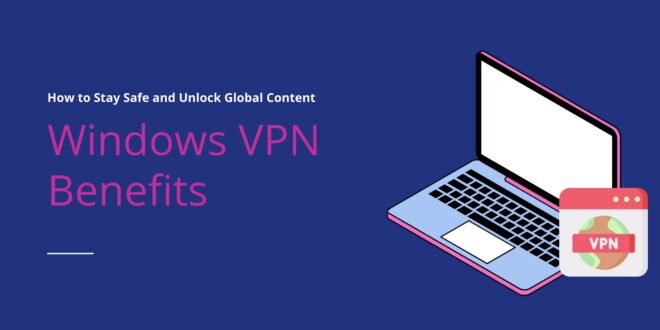Imagine this: You’re at a coffee shop, sipping your latte while scrolling through your favorite shows. You click on a link to stream a movie, only to find it’s not available in your country. Frustrating, right? Or maybe you’ve noticed your internet slowing down during peak hours—just when you’re trying to win a match in your favorite online game.
Here’s the thing: These issues are common, but they’re also avoidable. The solution? A Windows VPN.
Whether you’re after security, privacy, or access to region-locked content, a VPN is your new best friend. Let’s dive into the benefits of using a VPN on Windows and how it can revolutionize the way you browse, stream, and game.
What Is a Windows VPN?
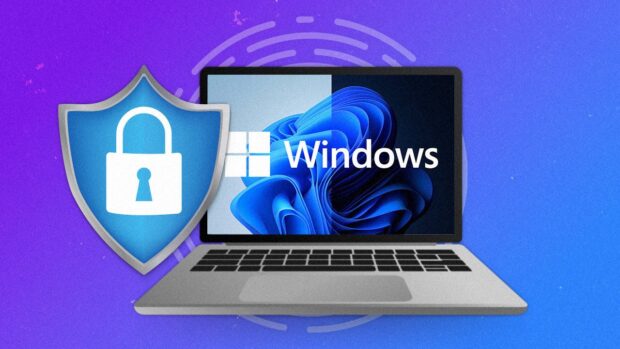
Let’s start with the basics. A VPN (Virtual Private Network) is a tool that encrypts your internet connection and routes it through a secure server in another location. In simple terms, it acts like a secret tunnel, protecting your data from prying eyes.
Why Use a VPN on Windows?
Windows is one of the most popular operating systems in the world, making it a prime target for hackers and data snoopers. A Windows VPN ensures your connection stays secure while giving you access to tools like split tunneling and customizable settings for a seamless browsing experience.
Key Benefits of Using a Windows VPN
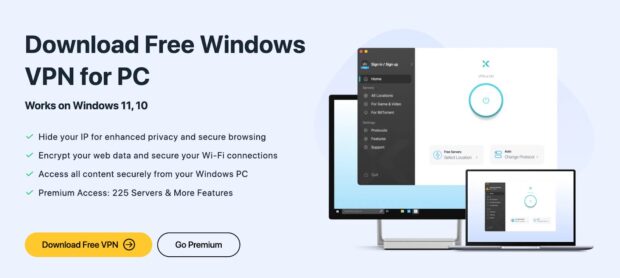
So, why should you bother with a VPN on your Windows PC? Here are the top reasons:
1. Enhanced Security on Public Networks
Public Wi-Fi is everywhere—cafes, airports, hotels—but it’s also a playground for hackers. Without protection, your sensitive data, like passwords and credit card details, could be exposed.
How a VPN Helps:
A VPN encrypts your connection, making it impossible for cybercriminals to intercept your data. Next time you connect to that coffee shop Wi-Fi, you can sip your latte in peace.
2. Protecting Privacy from ISPs and Hackers
Did you know your Internet Service Provider (ISP) tracks your online activity? Every website you visit and every file you download is logged and often sold to advertisers. Creepy, right?
How a VPN Helps:
With a VPN, your online activity is hidden. It masks your IP address and encrypts your data, keeping your browsing habits private from ISPs, hackers, and even the nosy neighbor next door.
3. Bypassing Geo-Restrictions
Ever tried to stream a show on Netflix, only to get the dreaded “This title isn’t available in your region” message? Streaming platforms, gaming services, and websites often lock content based on location.
How a VPN Helps:
A VPN lets you connect to servers in other countries, giving you access to region-specific content. Want to binge-watch a Japanese anime or catch the latest UK-only series? A VPN makes it possible.
4. Avoiding Bandwidth Throttling

Have you ever noticed your internet slowing down when streaming or gaming? That’s bandwidth throttling—when your ISP deliberately reduces your connection speed during high usage periods.
How a VPN Helps:
By encrypting your traffic, a VPN prevents your ISP from seeing what you’re doing online, making throttling nearly impossible. Enjoy uninterrupted streaming, gaming, and browsing, no matter the time of day.
5. Secure Remote Work and File Sharing
Working remotely has become the norm, but accessing sensitive work files on an unsecured connection can be risky.
How a VPN Helps:
A VPN encrypts your connection, ensuring secure access to company networks and protecting your data during file transfers. Whether you’re logging in from home or a hotel room, your work stays private.
How to Choose the Best Windows VPN
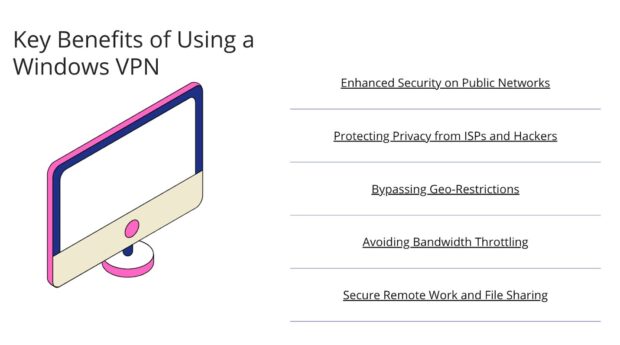
Not all VPNs are created equal. Here’s what to look for when choosing the right one for your Windows PC:
1. Speed
A fast VPN ensures smooth streaming, gaming, and browsing. Look for providers that offer unlimited bandwidth and high-speed servers.
2. Server Locations
The more servers, the better. A wide server network gives you access to content from multiple regions and ensures faster connections.
3. Ease of Use
Choose a VPN with a user-friendly app designed specifically for Windows. Features like one-click connections and split tunneling make setup a breeze.
4. Security Features
Look for AES-256 encryption, a no-logs policy, and features like a kill switch to keep your data secure even if the connection drops.
Top Recommendations for 2025:
- NordVPN: Known for speed and security.
- Surfshark: Affordable with unlimited device connections.
- X-VPN: Offers a large server network and reliable performance.
Setting Up a VPN on Windows
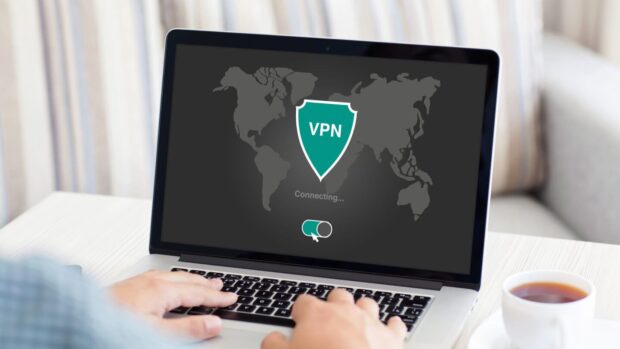
Setting up a VPN on your Windows PC is easier than you think. Here’s a quick guide:
- Choose a VPN Provider: Subscribe to a trusted VPN service.
- Download the App: Install the Windows-compatible app from the provider’s website.
- Log In: Use your account credentials to log into the app.
- Select a Server: Choose a server location based on your needs (e.g., US for Hulu, UK for BBC iPlayer).
- Enable Security Features: Turn on the kill switch and other features for added protection.
- Connect and Browse: Start enjoying a secure, unrestricted internet experience!
Common Misconceptions About Windows VPNs
Let’s clear up a few myths about VPNs:
1. “VPNs Slow Down Internet Speed”
While VPNs may slightly reduce speed due to encryption, premium services minimize this impact. You’re unlikely to notice any difference with a quality provider.
2. “VPNs Are Only for Tech Experts”
Modern VPNs are designed for everyone. User-friendly apps and one-click connections make them accessible, even for beginners.
3. “VPNs Are Illegal”
VPNs are legal in most countries. However, always check local regulations to ensure compliance.
Conclusion
Whether you’re protecting your privacy, accessing global content, or securing your work, a Windows VPN is a game-changer. You can also install a browser extension for added convenience. From encrypting your connection on public Wi-Fi to bypassing geo-restrictions, the benefits are truly endless.
Start exploring VPN options today to stay safe, unlock global content, and enjoy a seamless online experience. With the right VPN, your Windows PC becomes a powerful tool for secure and unrestricted browsing.
 Jewel Beat
Jewel Beat
